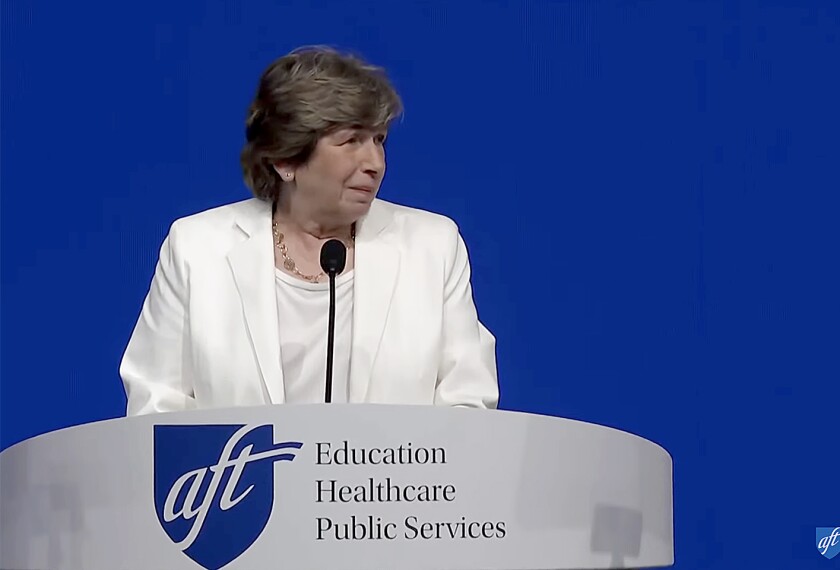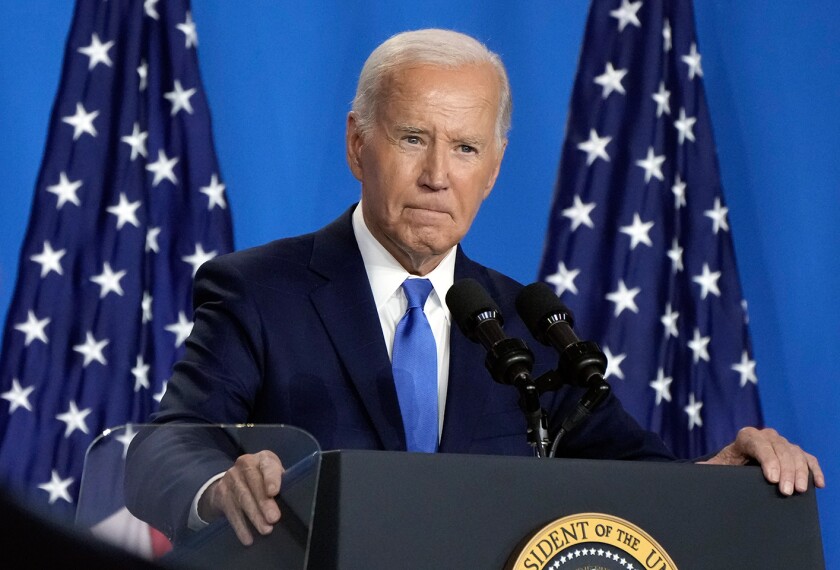The following offers education-related highlights of the recent legislative sessions. The enrollment figures are based on estimated fall 2000 data reported by the National Center for Education Statistics for prekindergarten through 12th grade in public elementary and secondary schools. The figures for precollegiate education spending include money for state education administration, but not federal, flow-through dollars, unless otherwise noted.
INDIANA
Leaner Times Leave Mark on K-12 Spending Plan
In its budget for the upcoming biennium, Indiana increased the general operating aid it gives school districts and also made available a small amount of funding for the first time for districts to run all-day-kindergarten programs.
Given the economic slowdown in the state, officials in the department of education are feeling grateful about even modest increases in money for schools, according to Terry Spradlin, the legislative liaison for the department.
“All things considered, it’s a good budget for K-12 education,” Mr. Spradlin said. “By funding an all-day kindergarten and some other new things, we’ve got our foot in the door, and two years from now, if we have an upturn of the economy, we’ll be able to get more funding.”
| |
| | |
| Senate: 18 Democrats 32 Republicans | |
| House: 53 Democrats 47 Republicans | |
| Enrollment: 989,000 |
The state has allocated $3.41 billion for general operating aid to school districts in the 2001-02 fiscal year, a 3.5 percent increase over what it gave districts during the current fiscal year. And the general operating-aid allocation for fiscal 2002-03 contains an additional 3.5 percent increase over fiscal 2001-02. The full state K-12 budget for fiscal 2001-02 is $3.75 billion and will increase to $3.89 billion in fiscal 2002-03.
The budget contains $10 million for each year of the biennium for all-day kindergarten programs.
In another move that pleased the department of education, the legislature agreed on a new cutoff date of July 1 for when kindergartners must turn 5 to enroll in school the following fall. While many states use a cutoff date of Sept. 1, Indiana has required children to have turned 5 by June 1 to enter kindergarten the following fall. The change will permit more children to enter school at a younger age, which advocates of the move say is particularly beneficial to children who have little access to informal education before they enter school.
State education officials had hoped to get more money for summer schools, alternative education programs, adult education, and programs for students with limited English skills, but the legislature left the levels of funding for those areas unchanged.
Many of Gov. Frank L. O’Bannon’s proposals for new education funding were either greatly modified or rejected by the legislature. For example, the governor had proposed that the state provide $50 million over the biennium for school-readiness programs, including full-day kindergarten. But the final budget contained only $20 million for full-day kindergarten.
Also, the governor had requested that the state spend $30 million over the biennium on a teacher-training program that was authorized as part of school accountability legislation passed in 1999. The legislature approved $16.25 million for the program, though, which will be spent during the second year of the biennium.
But Mr. O’Bannon was pleased that the legislature passed a law this spring that will permit charter schools in Indiana, something he had promoted for seven years. (“Indiana Legislature Passes Charter School Law,” April 25, 2001.)
—Mary Ann Zehr
IOWA
Teacher-Salary Package Cuts a New Policy Path
Passage of a groundbreaking teacher-compensation package and declining state revenues dominated this year’s legislative session in Iowa.
The state scrapped its traditional teacher-salary schedule, which was based on seniority, and replaced it with a plan that will pay educators based on their work performance and their students’ achievement. (“Iowa Approves Performance Pay for Its Teachers,” May 16, 2001.)
Although opposed by the Iowa State Education Association and many Democrats, Gov. Tom Vilsack signed the plan into law last month, along with the state’s $2 billion K-12 education budget for the coming fiscal year.
The teacher-pay plan, which is expected to cost the state $40 million in the first year, establishes standards for teachers, creates a new evaluation system, and provides cash rewards for staff members at schools in which students show improvement on tests. The minimum annual salary for beginning teachers will climb from $23,000 to $28,000.
| |
| | |
| Senate: 20 Democrats 30 Republicans | |
| House: 44 Democrats 56 Republicans | |
| Enrollment: 497,000 |
Most critics of the plan believe it relies too heavily on nonrenewable funding sources and local money. The compensation package is being financed with money from Iowa’s share of the multistate settlement with the nation’s tobacco companies.
The debate over the teacher-quality legislation had its especially contentious moments, acknowledged Ann McCarthy, the legislative liaison for the Iowa Department of Education. Yet, she added: “The positive thing is we had the Iowa legislature very engaged in teacher quality.”
For the 2001-02 fiscal year, every state agency was forced to contend with an average 6 percent budget cut to make up for a $300 million decrease in state revenues. Nevertheless, the legislature lived up to its pledge to increase the per-pupil allocation for schools’ day-to-day operations by 4 percent, or about $59 million, in fiscal 2001.
Still, there were significant cuts in higher education and the department of education, totaling $60 million, with community colleges and universities suffering the lion’s share of the budget reductions. And the education department’s general administration budget will be reduced by 6 percent, or $363,000.
The legislature also supported an additional $32 million in budget reductions to standing appropriations for education. School technology will suffer the deepest cut, with funding dropping by $20 million, bringing it to $10 million for fiscal 2002.
Mary Gannon, the director of policy services for the Iowa Association of School Boards, said school districts with long-term technology contracts would be forced to make tough budget decisions, shifting general-fund dollars to make up the shortfall.
But the governor used his line-item-veto authority to soften the budget blow by restoring money for a variety of other education programs earmarked by the legislature for cuts or no increase.
Gov. Vilsack restored the promised $10 million increase for class-size reductions and early-literacy programs. Funding for both multiyear programs, which began in the 2000 fiscal year, is up to $30 million, from $20 million this year. A minimum of $30 million has been promised for fiscal 2003. School districts statewide had put hiring on hold and considered laying off employees in anticipation of no increases for class-size- reduction and early literacy.
To support the teacher-quality package, Mr. Vilsack restored a proposed $2 million decrease in funding for teacher professional development, which brings that budget up to $23 million.
The governor also restored $550,000 set aside to reimburse families for providing transportation for their children who attend private schools.
Meanwhile, legislation to authorize charter schools made significant headway before falling by the wayside. The Senate passed the bill, which would have established pilot charter schools and districts, by a vote of 33-16. In the House, however, it never reached a vote.
—Karla Scoon Reid
KANSAS
Finance Changes Debated, But Ultimately Dropped
Lawmakers vigorously debated revamping Kansas’ system of school finance this legislative session.
But in the end, they chose to leave the current plan intact, while providing cost-of-living increases for employees in the state’s 304 K-12 school districts and expanding programs for children considered at risk for academic failure.
Ultimately, the package passed mirrored a proposal articulated by Gov. Bill Graves in his State of the State Address in January. The legislation provides $67 million in new funding for precollegiate education in fiscal 2002, for a total of $2.4 billion. The state’s overall fiscal 2002 budget is $4.5 billion.
| |
| | |
| Senate: 10 Democrats 30 Republicans | |
| House: 47 Democrats 78 Republicans | |
| Enrollment: 470,000 |
The plan increases per-pupil spending by $50, to $3,870; allocates $7.5 million more to expand two established programs for preschool and elementary school students deemed at risk; and provides $8 million more to fund the state’s share of special education expenses.
State officials, however, say that the latter increase will be nearly negated by special education costs that are rising at a sometimes staggering rate.
While lawmakers touted their ability to hold taxes at the current level, critics contend that the package provides far too little for schools to run properly.
“This a woefully inadequate increase,” said Mark Tallman, a lobbyist for the Kansas Association of School Boards, which represents 294 school districts.
Budget increases total less than half the rate of inflation, and as a consequence, local school districts will have to raise taxes, Mr. Tallman said. Meanwhile, localities will have to find a way to finance raises for teachers, an important consideration in attracting and retaining educators, he said.
Members of the House and the Senate, eyeing revenue projections that fell short of estimates, soundly rejected legislation that would have changed the way the state pays for its public schools.
If enacted, the measures would have introduced new taxes or would have raised those already in place.
The legislature aimed to strike a balance, however, and shot down a bill that would have lowered the taxes earmarked for schools.
In the end, the lawmakers appropriated $220,000 to study the need to overhaul the school finance system. The report is due out in January.
—Julie Blair







